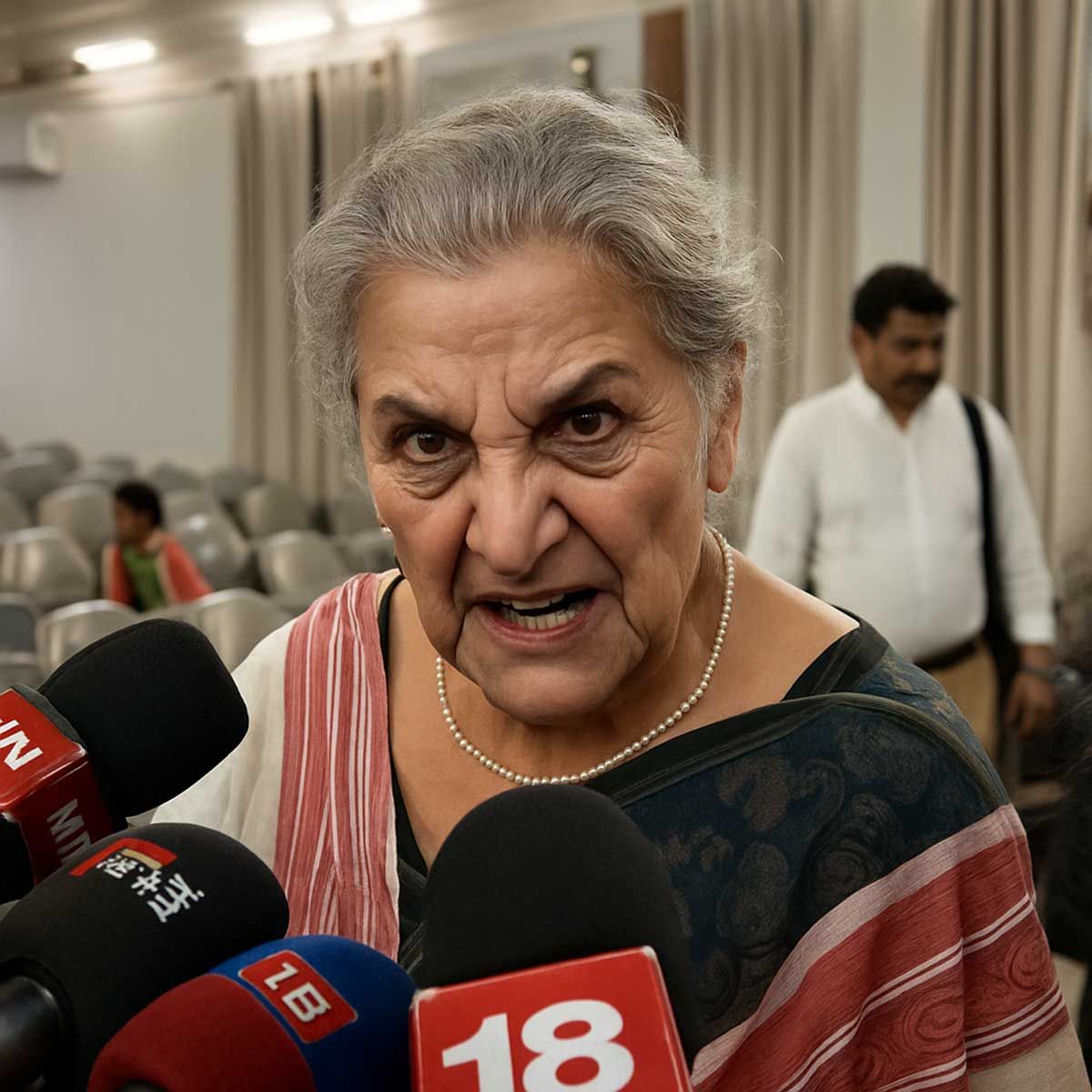More Coverage
Twitter Coverage
Satyaagrah
Written on
Satyaagrah
Written on
Satyaagrah
Written on
Satyaagrah
Written on
Satyaagrah
Written on
JOIN SATYAAGRAH SOCIAL MEDIA
Rahul Gandhi’s “vote chori” cry in Bihar revives memories of 1988, when a child’s “Rajiv Gandhi chor hai” on AIR sparked fury, violence at Sagar University, and exposed how Congress twisted protests into chaos while dragging children into politics

After the complete collapse of the much-publicized “Chowkidar Chor Hai” slogan during the 2019 elections, Rahul Gandhi has once again picked up a similar line of attack against Prime Minister Narendra Modi. In what many describe as another desperate attempt to destabilize the government, the Congress leader has launched a fresh campaign, this time accusing the ruling party of stealing votes. The opposition has branded this movement as the “vote chori” campaign, alleging that the Election Commission of India is colluding with the Modi government to disenfranchise ordinary voters and tilt the process in favor of the BJP.
|
A particular flashpoint has been Bihar, where elections are due. Here, the Mahagathbandhan has expressed outrage over the Special Intensive Revision (SIR) drive undertaken by the Election Commission. This process has reportedly removed at least 65 lakh fake voters from the electoral rolls. While officials described the exercise as a necessary step to ensure fair elections and eliminate fraud, the opposition parties have attacked it as a move targeted against their support base. According to them, many of these so-called bogus voters were aligned with the I.N.D.I. Alliance, and their removal weakens the opposition’s prospects in the polls.
The controversy intensified when the Election Commission formally asked Rahul Gandhi to either file an affidavit providing evidence for his claims or issue a public apology. However, Gandhi refused to comply. He stood his ground and said, “I am a politician, what I say to the people is my word. I am saying it to the people publicly, take it as an oath. Interestingly, they haven’t denied the information.” This statement reflected his style of making accusations without backing them up with proof, a strategy often described as “shoot and scoot,” something that has long been criticized as a hallmark of opposition rhetoric.
Adding to the debate was the intervention of Sanjay Kumar, co-director of Lokniti, a program under the Centre for the Study of Developing Societies (CSDS). He pointed out that the data being used by the Congress to fuel its campaign was incorrect. The leadership of the Congress party, however, treated this flawed information as if it were an unquestionable fact and used it to intensify their attacks on the BJP and the Election Commission.
|
Rahul Gandhi now involves children in his political pitch
If the earlier allegations were not dramatic enough, Rahul Gandhi has now claimed that even children are approaching him with concerns about “vote theft.” During a press conference held in Araria, Bihar, on 24th August, he described the situation in striking words:
“A very interesting thing is coming out which was not there in the last two yatras. Children are coming. It is a very strange phenomenon. They are coming to me. They are saying vote chor gaddi chord (vote thief, leave your chair). These are not adults. They are small. Now, a small child of six years has come to know and not just one, thousands. Now, the Election Commission should go and talk to these children. They will get to know.”
This extraordinary claim, presented without evidence, suggested that minors were echoing political slogans—an assertion that has drawn criticism for dragging children into partisan narratives.
Gandhi further added to his accusation, saying, “The Narendra Modi government after privatising public sector units now wants to steal votes of the poor through the SIR with the help of the Election Commission.” He firmly declared that the opposition bloc “will not allow this to happen in Bihar. The Constitution guarantees equal rights to every citizen of the country. The SIR is anti-constitutional. People of Bihar will give a befitting reply to the BJP and its allies in the assembly polls.”
By linking the revision of electoral rolls with an alleged plan to silence the poor, Gandhi has once again shifted the focus from procedural reforms to political conspiracy. His statements are being framed as part of a larger opposition narrative that portrays every institutional action as part of a scheme orchestrated by the ruling party.
|
A Child Once Accused Rajiv Gandhi of Being a ‘Thief’
Although it may seem shocking that politicians are invoking children to push their messages, the truth is this tactic isn’t new. A decades-old event from 1988 shows just how charged such moments can become.
During a live programme on All India Radio in Patna, a child was asked to tell a joke. The innocent response was startling: “Gali gali mein shor hai, Rajiv Gandhi chor hai” (everyone knows Rajiv Gandhi is a thief). This casual yet bold remark was caught mid-broadcast and rippled through the nation, revealing the tensions of that time. It came shortly after the Bofors scandal, and the slogan quickly became symbolic of the public’s mistrust in the government of the day.
What followed was no lighthearted reaction. In an entrance exam for the journalism department at Sagar University, a question asked was: “Which All India Radio station broadcast the phrase Rajiv Gandhi Chor Hai?” That question triggered a fierce and violent backlash from Youth Congress activists.
Professor Pradeep Krishnatreya, who headed the department, became an unintended target. His face was smeared with soot, and he was paraded around the campus in public humiliation. The Vice‑Chancellor, Prayag Das Hajela, resigned in protest. As he later said, “This is not merely an issue concerning one individual. There is an effort to add gangsterism to politics in this nation.”
|
News of the incident spread rapidly across campus. Faculty members united in outrage and launched a strike. They boycotted classes until those responsible were held accountable. Police arrested 10 offenders, but all were released on bail. Still, the university leadership began investigating Professor Krishnatreya himself. The police intervened further before he could even respond formally to the allegations.
The situation worsened when, under pressure from political forces, Professor Krishnatreya was arrested under Sections 294 and 504 of the Indian Penal Code—charged with indecent conduct, insult, and disturbing public peace. Amid widespread condemnation, he tried to explain himself, saying:
“I was unaware of the issues surrounding the question. There was no ill intent behind it. I raised it because it was a significant event, and I aimed to assess the alertness and memory of the candidate.” He made this defense on 8th August.
That same morning, a group led by Youth Congress district chief Rakesh Sharma stormed the Vice‑Chancellor’s office, demanding Krishnatreya's immediate removal. Hajela refused and replied firmly:
“Any action against him can only be taken after an inquiry is conducted and a report is presented to the university executive council on 17th August. I cannot dismiss him merely because some politicians desire it.”
Politically, Rakesh Sharma brushed off the assault. He claimed that Krishnatreya caused his own suffering and even staged the blackened face for attention. The professor went home after medical treatment—still with his face painted. Later that evening, he attended a teachers’ union meeting, again with his face uncleaned. A supportive colleague mirrored his blackened appearance as a gesture of solidarity.
Teachers rallied, and the campus was filled with silence and protests. Classes were boycotted for a week until justice was demanded. In a sudden turn, the state governor dissolved the university's executive and academic councils. All power was handed to a new Vice‑Chancellor, M. L. Jain. A heavy hush enveloped the campus, marking a deeply unsettling end to the crisis.
 Support Us
Support Us
Satyagraha was born from the heart of our land, with an undying aim to unveil the true essence of Bharat. It seeks to illuminate the hidden tales of our valiant freedom fighters and the rich chronicles that haven't yet sung their complete melody in the mainstream.
While platforms like NDTV and 'The Wire' effortlessly garner funds under the banner of safeguarding democracy, we at Satyagraha walk a different path. Our strength and resonance come from you. In this journey to weave a stronger Bharat, every little contribution amplifies our voice. Let's come together, contribute as you can, and champion the true spirit of our nation.
 |  |  |
| ICICI Bank of Satyaagrah | Razorpay Bank of Satyaagrah | PayPal Bank of Satyaagrah - For International Payments |
If all above doesn't work, then try the LINK below:
Please share the article on other platforms
DISCLAIMER: The author is solely responsible for the views expressed in this article. The author carries the responsibility for citing and/or licensing of images utilized within the text. The website also frequently uses non-commercial images for representational purposes only in line with the article. We are not responsible for the authenticity of such images. If some images have a copyright issue, we request the person/entity to contact us at This email address is being protected from spambots. You need JavaScript enabled to view it. and we will take the necessary actions to resolve the issue.
Related Articles
- Ashok Gehlot-Led Congress Govt in Rajasthan unleashed bulldozer to demolish 300-year-old Hindu temple in Alwar, houses of 85 Hindu families to ‘widen road’ citing masterplan: Over hundred families homeless in Rajgarh
- Biggest Secret Reveal - How ties between Indra Gandhi and KGB made India a puppet of USSR during the Cold War
- How Political ambitions of the Congress has silenced contributions of uncountable freedom fighters
- Rajiv Gandhi’s assassination convict AG Perarivalan receives hugs and a warm welcome from Tamil Nadu CM MK Stalin upon his release, Congress ally had been fighting to get him out of jail
- "The universe always balances the books": Congress leader Sajjan Kumar faces intensified legal scrutiny over the 1984 anti-Sikh riots, amidst a slew of charges, the spotlight centers on his alleged abetment in the Janakpuri and Vikaspuri incidents
- Retd Commander VK Jaitly admits that he was a witness to Rajiv and Sonia Gandhi using INS Viraat to vacation on Lakshwadeep
- Wikileaks and 5 lesser know facts of Indira Gandhi: Nuclear technology, corruption and foreign relations
- Rajiv Gandhi didn't call Army for 3 days, had no intention to stop 1984 Sikh massacre: Watch his speech justifying the riot
- "कालाध्याय": In the dark corridors of the 1980s, Coomar Narain and Colonel Alain Bolley orchestrated a deadly espionage ring, leaking top-secret defense files that not only endangered India's nuclear security but also manipulated billion-dollar arms deals
- Was Indira Gandhi a Soviet Agent - 100 Years of Russian Revolution
- "Cease to inquire what future has in store, and take as a gift whatever the day brings forth": Amit Shah on his birthday canceled FCRA licence of Sonia-run Rajiv Gandhi Foundation & Rajiv Gandhi Charitable Trust, was receiving funds from embassy of China
- Rahul Gandhi claims he hadn’t heard of ‘lynching’ before 2014: Time to revisit India’s bloodied history featuring his family members
- Did Antonia Maino had a 4-year affair with an Italian footballer Franco Luison before she met Rajiv Gandhi? Here is what we know
- "PM Modi mentions the 1966 bombing of Mizoram": When Indira Gandhi had ordered the IAF to carry out an aerial attack in Aizawl and its aftereffects that still reverberate in India's history, capturing Mizoram's tumultuous journey through adversity
- Sam Pitroda, draped in a cloak of telecom innovation, yet mired in ₹150 crore C-DoT scandal and exposed by the Nambiar Committee; a story of Congress-crafted illusion, where financial irregularities & political puppetry overshadowed technological promises




























